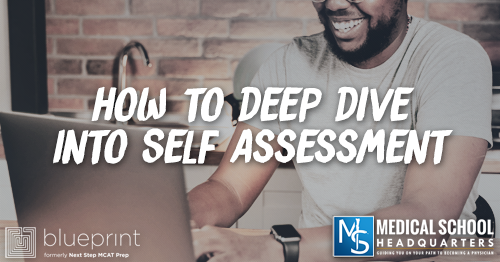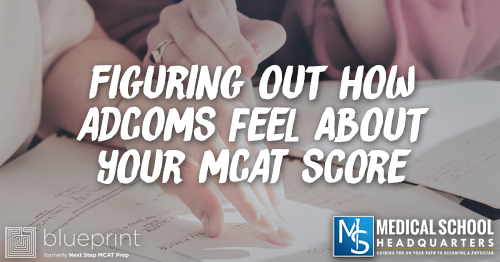Apple Podcasts | Google Podcasts
Session 202
As MCAT registration opens for early 2021 test dates, let’s discuss what month YOU should take the MCAT, how to plan for it, and what to expect this year.
This week, we’re taking a break from our full-length one discussion and jump into MCAT timing. As of this recording, the MCAT registration for January and March dates of 2021 has just opened.
And so, I wanted to jump in and have a discussion with Phil from Blueprint MCAT about registration timing and much more. Check them out and get $500 off the launch of their new live online courses by using the promo code MCATLOL.
Listen to this podcast episode with the player above, or keep reading for the highlights and takeaway points.
[03:09] What’s New This Year
First off, they’re opening up registration in phases. So you aren’t going to be able to register for all of the 2021 MCAT dates this year. They’ve separated over three different dates.
They opened up on November 10 at noon Eastern time. And you’re going to be able to register for the dates in both January and March. They have announced dates for April, May, June, July, August, and September but you still won’t be able to register for those dates.
April, May, and June test dates will open up in February while registration for July, August, and September test dates will open up in May.
They’ve also allowed pre-registration which is now open. You can go in and input your data and information. That way, they don’t have 10,000 people all trying to put in their data at the same time. You can’t register. But you can put all of your data in there ahead of time so that when the registration opens, it’s a little bit easier on the system.
[07:00] Two Testing Times Per Day
They’re going back to a regular timed full test. They are offering two test times per day, which is interesting, because pre-COVID, they didn’t do this.
'It's a good move to go to the longer test because it gives the AAMC more data. They can be more confident in the scores they're giving.'Click To TweetBut Phil says there are a lot of students who really struggled without the lunch break and not being able to take a second to just unwind. He would rather take the 7.5 hours version than the 5 hours and 45 minutes version just so he could take a break. That way, he could recatch his thoughts and loosen up his neck muscles.
They’re going back to the long version. They’re still doing all of the normal COVID protocol. So you got to wear a mask while you’re in the test center as well as the spacing, which is probably the reason behind the two testing timeframes. They cut the population in the room into half by doubling the number of tests per day, one in the morning and another one in the evening. So this is also something to consider and think about with your prep as well. Some people may find their brains working well in the morning, while for others it’s late in the day.
“Keep track of how you feel and what's going on with your rhythms.” Click To TweetThis is actually a bonus because there only used to be one testing time held in the morning. And if you’re someone who works a little bit better later in the day, then that’s a new opportunity which you didn’t have before.
Especially as your test date approaches, you need to be practicing at the timeframe that you’re going to be taking the actual test. So if you’re taking your practice test at the same time that you will be taking the actual test.
Do the bulk of your studying earlier in the morning to get your brain and body used to it and you’re mentally active in the early hours. And if you’re taking the test in the afternoon at around 3 pm, that means you’re going to finish at 11 pm. So if that’s going to be past your bedtime then you will have to consider that as well.
“Make sure you're taking the test at a time you're most mentally active.”Click To Tweet[11:33] When to Take the MCAT
First off, you want to take a test when you’re ready. The application process itself is not the easiest thing. Think about filling out the application, writing your essays, your activities, and getting your transcripts and letters of recommendation. It’s an ordeal to get the application together.
'When will you be ready? That matters more than anything else. That's the highest priority.'Click To TweetIf you have taken your MCAT early enough, then you don’t have to worry about doing that at the same time as trying to fill out the application. You can work on your secondaries.
Check out www.secondaryapps.com. It’s a website that you can look at to see what secondaries are from different schools. Look at those beforehand and try to craft some before you get your secondaries back so you already have something written for them. And then there’s more work to be done after that.
If you want to be in that first wave of applications in June, that means taking the exam in April or early May. You have to consider this because the MCAT is going back to the four weeks schedule of getting your test back.
If you want to be in the first wave of application, you can do that without an MCAT score because it’s not needed to submit your primary application. It’s not needed to be verified by the AAMC or any of the other application services.
The MCAT is just needed for the medical school to really consider your application complete. And most medical schools will still send you a secondary without your MCAT score. So the MCAT score isn’t really holding up anything in terms of application submission. But it definitely gets in the way of being able to do it all.
Students for Ethical Admissions has a list of schools that have changed their MCAT policies. So go check them out.
The most important thing is to make sure you’re ready. Don’t plan on retaking if you’re going to take the test in January so you can retake in March. It would be better to just be ready in March and just take the exam and do well in March. The data is less important than the actual work preparation. And so you definitely want to want to factor that in. Ignore that and you’re just going to delay the process even more.
The AAMC has also announced that they’re going to keep the refunds and rescheduling for free throughout at least these first couple rounds of the exams through January and March.
[20:15] Final Thoughts
'Plan ahead.'Click To TweetMost students spend somewhere between 200 and 300 hours prepping for the MCAT in order to prep properly and 250-300 hours is what you should be shooting for.
If you’re spending 15 hours a week studying for the MCAT in order to get 300 hours, that’s 20 weeks. And five months is a good chunk of time. So maybe you don’t need 300 hours, maybe you only have to put in 240 hours and that’s fine.
But again, be sure to plan ahead because prepping for the MCAT properly takes a good chunk of effort.
Links:
Blueprint MCAT (Get $500 off the launch of their new live online courses by using the promo code MCATLOL)
Students for Ethical Admissions
Twitter channel: @aamc_mcat
SEARCH SITE
SEARCH SITE
LISTEN FOR FREE












